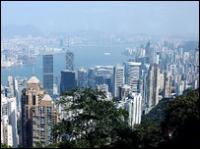神秘内容 Loading...
 (来源:EnglishCN.com) (来源:EnglishCN.com)
By Steve Schifferes
Globalisation reporter, BBC News, Shanghai, China
Business seats on flights from Hong Kong to Beijing and Shanghai are now packed full on Monday mornings and Friday evenings, according to China's banking regulator, Liu Mingkang.
A decade ago, the migration was in the other direction, with migrant labourers from China flooding into Hong Kong.
The reverse commuting from Hong Kong is one sign of the growing economic importance of mainland China compared to its former colony.
And Shanghai's vibrant shopping streets now attract visitors from Hong Kong and around the world.
But residents of Shanghai - whose per capita income, though it is the highest in China, is still well below people in Hong Kong - still envy their richer cousins.
And according to Professor Saskia Sassen, an expert on globalisation who teaches at the London School of Economics, Shanghai is still lagging behind Hong Kong as a truly global city.
But will it overtake its rival in the race for financial supremacy?
Economic liberalisation
In the 1980s, Hong Kong was the vital entrepot between mainland China and the outside world.
Goods assembled in China were re-exported through Hong Kong, while financial and business services were provided for Chinese companies which traded with the West.
And when the Chinese government decided to open up its economy to foreign investment, the first special economic zone - Shenzhen - was chosen for its proximity to Hong Kong.
Many Hong Kong businesses, especially in textiles and clothing, relocated, bringing expertise and capital to the mainland.
The specialisation of Hong Kong in financial and business services increased as manufacturing jobs moved to the mainland.
And Chinese companies used the Hong Kong stock market when they wanted to raise money.
Hong Kong's open financial markets meant that it came under pressure during the Asian financial crisis in 1997, just after the handover.
Only massive intervention by the government prevented a financial meltdown.
The Shanghai boom
But by the 1990s, it had become clear that China's economic policy-makers were tilting towards the development of other economic regions, especially Shanghai and Beijing, as the leading centres of foreign investment.
A clique of leaders including Zhu Róngji - the prime minister who was former mayor of Shanghai - approved the expansion of the city on its eastern bank to create a new financial district.
The area, Pudong, soon became the leading centre of foreign investment, where multinational firms congregated and multinational banks placed their headquarters.
Shanghai's dynamic economic growth, fuelled by exports, has also transformed the physical fabric of the city and transformed the whole Shanghai Delta region.
And in the government's latest five-year plan, it is these two regions, not the Pearl River Delta around Hong Kong, that is favoured with new, high-tech development.
Financial competition
China has been determined to develop the financial services industry on the mainland.
In 1990 it created a new stock market in Shanghai to rival Hong Kong.
Open mainly to domestic investors, it is now in the midst of an unprecedented boom.
China boosted its own banking sector, and increased regulation, especially after the banks got into difficulties over bad loans to state firms.
And it is gradually opening up the financial sector to international firms, with foreign banks now being allowed to open yuan accounts for domestic residents.
The Shanghai stock market now rivals Hong Kong
However, the Chinese banking sector is still largely involved in lending to the corporate sector, not individuals.
And financial services for ordinary citizens are still relatively undeveloped, with only 60 million credit cards, for example, in a population of 1.3 billion.
China's domestic market for financial services, however, is likely to grow rapidly, and it is attracting investment from firms around the world.
World cities
According to Professor Sassen, Hong Kong still has advantages that Shanghai cannot match in terms of financial sophistication.
Hong Kong's financial sector's strength is innovation
She calls Hong Kong a world city, with its financial markets more attuned to the innovations in global capital markets.
In her view, Hong Kong is closer to New York, and Shanghai to Chicago - a huge city serving an industrial hinterland, with specialist financial and trading services evolving to smooth the path for industry. |

